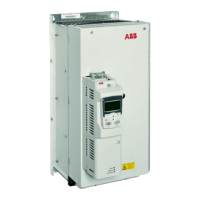Control through the embedded fieldbus interface 319
Control Word and Status Word
The fieldbus Control Word (CW) is a 16-bit or 32-bit packed boolean word. It is the
principal means of controlling the drive from a fieldbus system. The CW is sent by the
fieldbus controller to the drive. The drive switches between its states according to the
bit-coded instructions of the CW. In the embedded fieldbus communication, the CW is
written to drive parameter 02.36 EFB main cw from where you can use it in the
control of the drive. The fieldbus CW is either written to the drive CW as it is, or the
data is converted. See section About the EFB communication profiles on page 321.
The fieldbus Status Word (SW) is a 16-bit or 32- bit packed boolean word. It contains
status information from the drive to the fieldbus controller. In the embedded fieldbus
communication, the SW is read from drive parameter 02.37 EFB main sw. The drive
SW is either written to the fieldbus SW as it is or the data is converted. See section
About the EFB communication profiles on page 321.
References
Fieldbus references (REF1 and REF2) are 16-bit or 32-bit signed integers. The
contents of each reference word can be used as the speed, frequency, torque or
process reference. In the embedded fieldbus communication, the REF1 and REF2
are written to 02.38 EFB main ref1 and 02.39 EFB main ref2 from where you can use
them in the control of the drive. The references are either written to the drive
references as they are, or the values are scaled. See section About the EFB
communication profiles on page 321.
Actual values
Fieldbus actual signals (ACT1 and ACT2) are 16-bit or 32-bit signed integers. They
convey selected drive parameter values from the drive to the master. The drive
values are either written to the fieldbus actual values as they are, or the values are
scaled. See section About the EFB communication profiles on page 321.
Data inputs/outputs
Data input/output (I/O) are 16-bit or 32-bit words containing selected drive parameter
values. Parameters 58.35 Data I/O 1 … 58.58 Data I/O 24 define the addresses from
which the master either reads data (input) or to which it writes data (output).
Register addressing
The address field of Modbus requests for accessing holding registers is 16 bits. This
allows the Modbus protocol to support addressing of 65536 holding registers.
Historically, Modbus master devices used 5-digit decimal addresses from 40001 to
49999 to represent holding register addresses. The 5-digit decimal addressing limited
to 9999 the number of holding registers that could be addressed.

